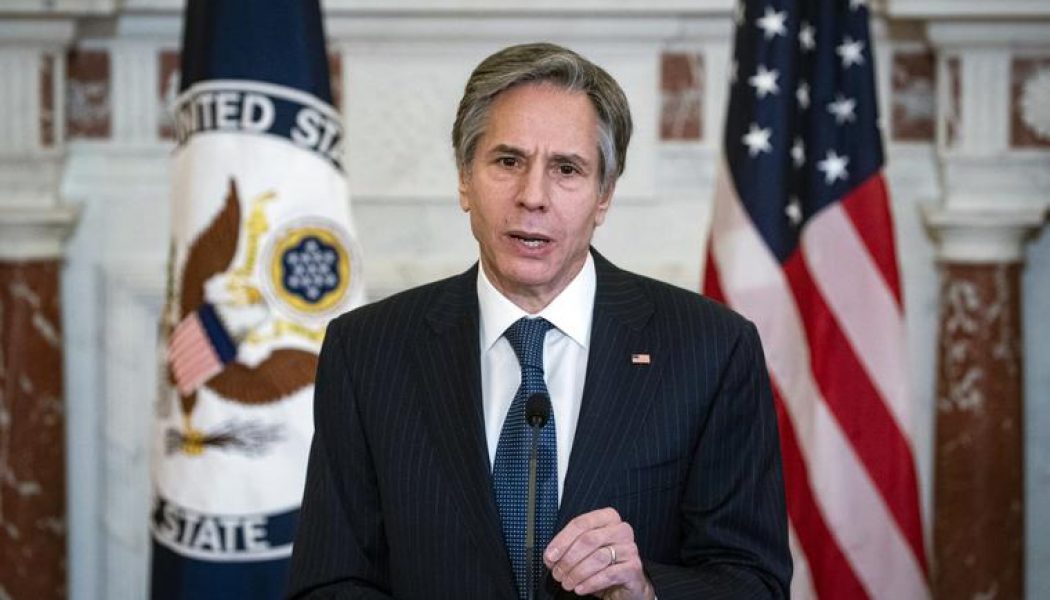
On March 30, at a press conference announcing the release of the U.S. State Department’s annual human rights report, Secretary of State Antony Blinken pointedly “repudiated” the report of the Commission on Unalienable Rights that his predecessor, Michael Pompeo, had appointed.
Why this repudiation?
Blinken called the report “unbalanced” and complained that it promoted “a hierarchy that makes some rights more important than others.” He did not elaborate on where the imbalance or what the hierarchy was, but did claim to be fulfilling “decisively” his earlier promise to repudiate the commission at his Senate confirmation hearing on Jan. 19. He had voiced this promise together with a pledge to pursue the “LGBTQI” cause zealously if confirmed.
A further clue to Blinken’s repudiation lies in the public controversy that arose after Pompeo first announced the commission at the end of May 2019, explaining that it “will provide fresh thinking about human rights discourse where such discourse has departed from our nation’s founding principles of natural law and natural rights.”
This simple sentence elicited the ire of legion progressive human rights activists — more than 400 signed one statement — who cried that natural law meant the rejection of LGBTQ and abortion rights and the elevation of religious freedom.
When Pompeo launched the commission on July 8, he dropped the language of natural law and natural rights but upheld the commission’s charge of investigating the principles that underlie human rights and their roots in the American founding. The commission fulfilled its charge and released its final report in August 2020.
Blinken’s denunciation was unfair and misleading. What he repudiated was a phantom report, one that was never written, whose critics shouted it down even before its authors were appointed, and had little to do with the report that actually emerged. The letters LGBTQ are not to be found in its pages; abortion is not discussed; natural law is not insisted upon; and the hierarchy that is proposed is mainly a prioritization of rights that are binding in all places and circumstances over those that are tailored more flexibly to circumstance and locale.
What the report advocates, rather, is the restoration of consensus, continuity and credibility — or what may be called the magisterium of human rights.
Catholics are familiar with a magisterium. It is the teaching authority of their Church, exercised by the pope and the bishops. Several dimensions of this authority serve to strengthen it. In its vertical dimension, it is God who guarantees the truth of what is taught. In its horizontal dimension, its teaching is held by bishops around the world in vastly variegated cultures and locales. In its temporal dimension, it articulates doctrine consistently over centuries. In its depth dimension, its teaching possesses intelligibility, satisfying the intellect and the heart. Should a pope or a bishop teach falsely or confusingly, the magisterium’s authority is weakened.
Analogously, there is a human rights magisterium, a tradition that consists of principles, authorities, landmark documents and events, and a community of people dedicated to the principles, and that is strengthened — or weakened — along the same dimensions as the magisterium of the Catholic Church.
What the commission’s report recommends may be thought of as a strengthening of the human rights magisterium. With respect to the vertical dimension, while the report does not require that human rights be viewed as divinely bestowed, it does hold that they are “pre-political,” “inherent in human beings” and “inalienable,” the eponymous term derived from the U.S. Declaration of Independence. Human rights do not exist at the pleasure of governments or by virtue of positive law, but rather exist prior to law and institutions and serve as standards by which they may be judged.
The human rights magisterium’s horizontal dimension is the vast array of countries and cultures that have agreed to them. The report lauds the framers of the Universal Declaration of Human Rights of 1948 — the founding charter of modern human rights — for performing the “extraordinary and unprecedented” feat of articulating rights that both confer meaningful protections and secured the approval of 48 vastly diverse countries. The framers succeeded in part by keeping the list of human rights fairly short and limited to those likeliest to garner consensus. Today, it is the UDHR and those conventions whose force depends on the explicit support of states that enjoy the widest respect, the report points out.
The temporal dimension of human rights is their historical continuity. In the United States, the Declaration of Independence’s proclamation that “all men are created equal [and] endowed by their Creator with certain inalienable rights” formed a deposit to which champions of justice would appeal in subsequent decades, including women’s rights advocates, Frederick Douglass, President Abraham Lincoln, President Franklin Roosevelt and Martin Luther King. In the global human rights movement, the most prominent major developments look back to the Universal Declaration of Human Rights. Consistency with such founding documents is the mark of a strong human rights regime, the report argues.
The depth dimension lies in qualities of human rights that the report stresses, including their consistency with human reason, the interconnections among them, and their resonance in diverse national cultures. The report also maintains, though, that rights need not and should not be founded publicly and officially on any single theory, philosophy or ideology.
These several dimensions yield the main leitmotif that runs through the report’s recommendations, namely a counsel against novel and proliferating rights claims that are professed by committees, advocacy groups and individual experts; do not command a consensus among the world’s diverse states; do not stand in continuity with the human rights tradition; are often contrary to reason; and which serve to weaken the human rights magisterium. The commission’s report is a conservative one, not in the modern ideological sense, but rather in the spirit of British statesman Edmund Burke, who called for judiciousness, caution and maintaining tradition.
The report’s approach has been vindicated by its global reception, especially in countries where core human rights are both vulnerable and valued, and in countries and among movements in which the novel claims of human rights activists are often, well, repudiated. The report has secured the endorsement of the Centrist Democrat International, a global coalition of 73 parties, and of Indonesia’s Nahdlatul Ulama (NU), a movement that represents 90 million Muslims and that advocates for religious tolerance. The NU’s endorsement bears out the commission’s claim that core human rights can gain the assent of traditions that are culturally and religiously diverse yet contain long traditions of rights, observes Timothy Samuel Shah, a distinguished research scholar in politics at the University of Dallas who also serves as director of strategic initiatives for the Center for Shared Civilizational Values, which is based in Indonesia and works closely with the NU.
In light of this overseas reception, the repudiation of the report by Blinken, whose job is to lead the United States’ promotion of human rights overseas, is lamentable and ironic. He has missed an opportunity to sustain the human rights magisterium across administrations in the U.S. and has chosen instead to endorse the sort of causes that undermine the strength of the human rights magisterium. And, he has taken this approach under a president who has pledged to be a unifier.
Daniel Philpott is a professor of political science at the University of Notre Dame and author of the recent report, “Religious Freedom in International Human Rights Law.” published by the Heritage Foundation
Join Our Telegram Group : Salvation & Prosperity









